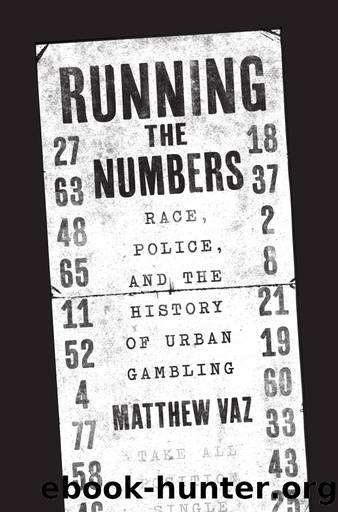Running the Numbers by Matthew Vaz

Author:Matthew Vaz [Vaz, Matthew]
Language: eng
Format: epub
Tags: HIS000000 History / General
Publisher: The University of Chicago Press
Published: 2020-05-08T00:00:00+00:00
The historical development of the Fourth Amendment protection against unlawful search and seizure up to that time was a long and halting process. The amendment gained meaningful yet limited application with the 1914 case of Weeks v. United States. The matter involved gambler Fremont Weeks, an express messenger arrested at a Missouri train station by US marshals on the charge of using the mails to further a lottery scheme. After he was arrested, the marshals entered his home and seized materials that were later used at his trial. The Supreme Court determined that the search violated his Fourth Amendment rights. The majority opinion of Justice William R. Day stated, âIf letters and private documents can thus be seized and held and used as evidence against a citizen,â then the Fourth Amendment âis of no valueâ and âmight as well be stricken from the Constitution.â60
The circumstances of Weeks v. United States originated with policing by the federal government. The elaboration of the rule that unlawfully obtained evidence must be excluded at trial only applied as a protection in federal court. There was much controversy over the subsequent decades regarding whether the rule of exclusion should be applied in state criminal proceedings. Some states adopted the rule of Weeks, while most did not.61 The Supreme Court directly confronted the question of whether to apply the rule to the states in Wolf v. Colorado (1949). The case arose out of a warrantless search conducted by Denver police at the office of physician Julius Wolf. Evidence obtained during the search led to the conviction of Wolf in state court for conspiracy to commit abortion. The Supreme Court upheld the conviction of Dr. Wolf, ruling that evidence obtained by warrantless search could in fact be admitted in state court.62
Felix Frankfurterâs majority opinion in the case acknowledged, âThe security of oneâs privacy against arbitrary intrusion by the policeâwhich is at the core of the Fourth Amendmentâis basic to a free society.â But on the matter of âhow such arbitrary conduct should be checked, what remedies against it should be afforded,â Frankfurter pointed to âvarying solutions,â such as disciplinary action against officers or prosecution for trespass. He noted, âAs of today, 31 states reject the Weeks doctrine, 16 states are in agreement with it.â He argued that a remote power such as the federal government should be constrained by the Weeks doctrine, whereas local authorities, inherently more susceptible to local opinion, can be held responsible at the community level. Overall he rejected the notion that the first eight amendments of the Bill of Rights are âincorporatedâ against the states by the due process clause of the Fourteenth Amendment.63
Justice Frank Murphy passionately dissented in the Wolf case. He scoffed at the notion that other remedies for police invasion were available. âThere is but one alternative to the rule of exclusion. That is no sanction at all.â In preparation of his dissent, Murphy corresponded with the chiefs of police of the nationâs thirty-eight largest cities, inquiring as to their practices of search and seizure.
Download
This site does not store any files on its server. We only index and link to content provided by other sites. Please contact the content providers to delete copyright contents if any and email us, we'll remove relevant links or contents immediately.
Nudge - Improving Decisions about Health, Wealth, and Happiness by Thaler Sunstein(7709)
The Fire Next Time by James Baldwin(5447)
iGen by Jean M. Twenge(5416)
Adulting by Kelly Williams Brown(4574)
The Sports Rules Book by Human Kinetics(4388)
The Hacking of the American Mind by Robert H. Lustig(4383)
The Ethical Slut by Janet W. Hardy(4253)
Captivate by Vanessa Van Edwards(3840)
Mummy Knew by Lisa James(3693)
In a Sunburned Country by Bill Bryson(3543)
The Worm at the Core by Sheldon Solomon(3487)
Ants Among Elephants by Sujatha Gidla(3467)
The 48 laws of power by Robert Greene & Joost Elffers(3293)
Suicide: A Study in Sociology by Emile Durkheim(3023)
The Slow Fix: Solve Problems, Work Smarter, and Live Better In a World Addicted to Speed by Carl Honore(3010)
The Tipping Point by Malcolm Gladwell(2925)
Humans of New York by Brandon Stanton(2873)
Get What's Yours for Medicare: Maximize Your Coverage, Minimize Your Costs by Philip Moeller(2739)
Handbook of Forensic Sociology and Psychology by Stephen J. Morewitz & Mark L. Goldstein(2705)
